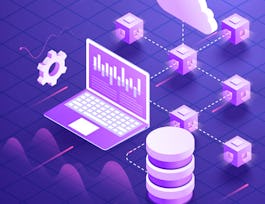Data Management
Earn Your Degree
Most Popular Courses
Top Rated Courses
Finish a Data Management Course in 12 Hours or Less
Launch Your Career
Most Popular Certificates
More Data Management Courses
Frequently Asked Questions about Data Management
Data is a massively valuable asset for businesses today, and data management is the process by which this resource is collected, organized, stored, and accessed. Data management and proper data integration is thus a critical part of IT systems, as it informs operational decision-making and strategic planning at the highest levels of an organization.
Database administration via database management systems (DBMS) is one of the chief responsibilities for professionals in this field, which must be effectively integrated with data pipelines, data warehouses, and other data infrastructure that collects, cleans, and delivers data at scale. Data managers are also increasingly responsible for data governance, ensuring data privacy and data protection in compliance with corporate policies as well as regulations such as GDPR.
Data management professionals can come from diverse educational backgrounds, such as computer science, business administration, or mathematics and statistics. Their most important skills are organizational and interpersonal; they need to be able to methodically collect, organize, and analyze large datasets while also communicating their relevance to both technical (i.e. data engineers) and non-technical (i.e. C-suite decision-makers) audiences.
Data managers also need strong computer science skills. That includes proficiency in programming languages such as Python and Java, database systems such as SQL and NoSQL, and operating systems such as UNIX and LINUX. As more and more business computer services move to the cloud, data management professionals increasingly must know how to work with cloud computing platforms like Azure, IBM Cloud, and Google Cloud.
In today's era of big data, data management careers are a big opportunity for growth. For example, according to the Bureau of Labor Statistics, database administrators had a median annual salary of $90,070 in 2018, and these jobs are expected to grow by 9% over the next decade - faster than the average for the economy overall.
There are a wide range of roles using data management skills besides database administrator. Businesses may hire specifically for data managers, data management specialists, and IT project managers to build and maintain their data systems. On the more technical side, data scientists and data engineers are responsible for building the data infrastructure needed to collect large datasets efficiently. And data mining analysts, operations analysts, and systems analysts use their expertise to turn these datasets into actionable business insights.
Online learning is a great way to develop your data management skills, whether you're just starting out or are a seasoned professional who needs to update their skills for the cloud computing era. Coursera offers Professional Certificates, MasterTrack certificates, Specializations, Guided Projects and courses in data management from top universities like University of Pennsylvania and University of Minnesota, companies like Google Cloud, IBM, Cloudera, and MongoDB. Some of the high-demand courses in data management include Bigquery, MongoDB, and big data analytics.
If you want to learn about data management within the context of a full Computer Science Degree Program, Coursera also offers bachelors and masters degrees from top-ranked schools like University of Illinois, Arizona State University, and Imperial College London. Whatever your goals are, online courses allow you to learn on a flexible schedule from anywhere in the world.
You should typically have at least basic computer skills, such as how to use windowing systems and how to cut, copy, and paste text, before starting to learn data management. Strong reading and math skills can also be useful when learning some data management concepts. Additionally, it can help if you are familiar with spreadsheets, which can be used for storing large amounts of data and organizing data sets for easier analysis and management. It can also help to have studied the foundational concepts of financial technology, Google Docs, Google Slides, and business systems analysis.
People who enjoy using computer technology to perform complex tasks are typically best suited for roles in data management. This is because large corporations can collect vast amounts of data that data managers then organize into usable data sets, store, and retrieve when needed. People entering this field can also typically have strong critical thinking and analytical skills. Being highly organized is a trait that people who are well suited for data management careers have, and a careful eye for detail is also typically important in this area.
Data science and data engineering are two of the topics you can study that are related to data management. You could also pair your study of data management with the study of financial technology or IT project management. You could choose to study the related topics of data integrity or business intelligence. MongoDB, Google Cloud Platform, and BigQuery are three specific programs you could study that are related to data management.
Laboratories, hospitals, and government agencies are three places that typically hire people who have backgrounds in data management. Manufacturing businesses can also hire people with data management backgrounds to maintain databases. Transportation and logistics firms can also hire people with this background to perform large data mining projects or to manage information about drivers, vehicles, customers, and routes in a database. Additionally, organizations that manage a large amount of data, such as insurance companies and educational institutions, typically look for candidates who have data management experience to ensure the proper handling of client information.
Online Data Management courses offer a convenient and flexible way to enhance your knowledge or learn new Data Management skills. Choose from a wide range of Data Management courses offered by top universities and industry leaders tailored to various skill levels.
When looking to enhance your workforce's skills in Data Management, it's crucial to select a course that aligns with their current abilities and learning objectives. Our Skills Dashboard is an invaluable tool for identifying skill gaps and choosing the most appropriate course for effective upskilling. For a comprehensive understanding of how our courses can benefit your employees, explore the enterprise solutions we offer. Discover more about our tailored programs at Coursera for Business here.






































































































































